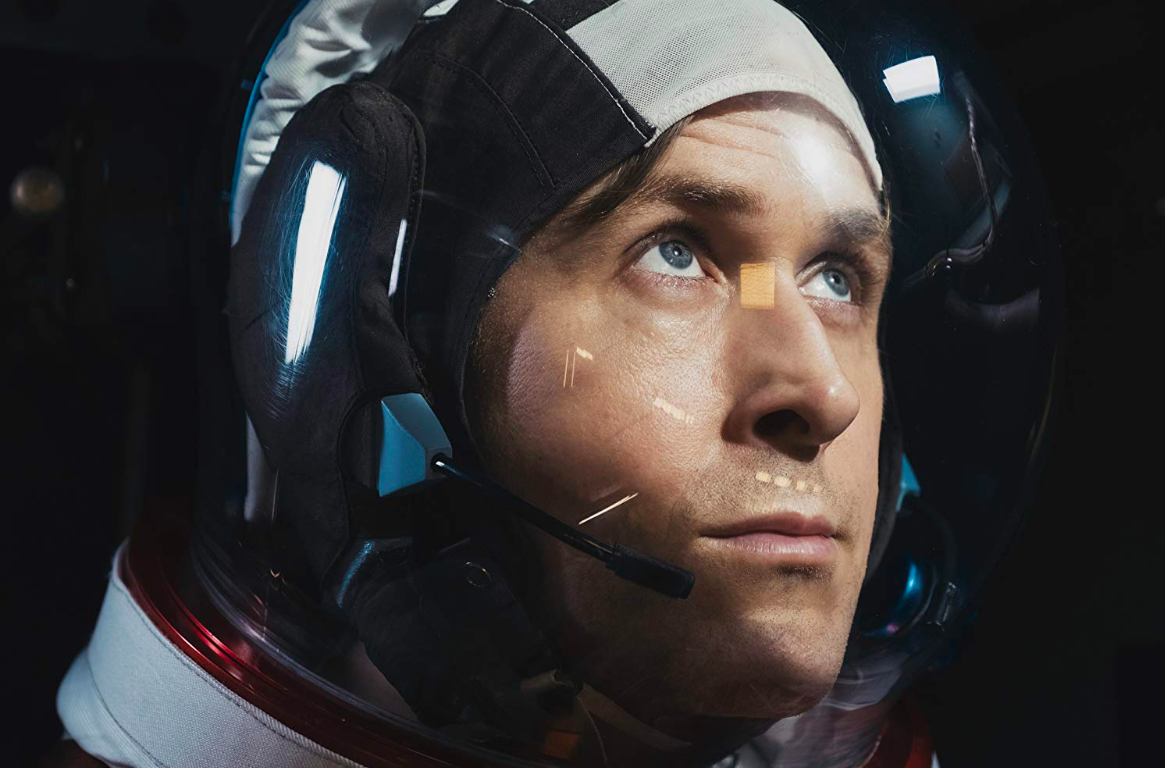Neil Armstrong, the first man to walk on the moon, is by all means an American hero. He was a family man whose ordinary life was turned upside down when he decided to participate in one of the most extraordinary feats in human history. Hence, it may come as a surprise for some that First Man is not exactly the patriotic, action-packed film one might expect from a story tackling American space exploration during the Cold War. The hints are there of course, but they remain subtle and the movie is all the better for it. With a strong dramatic core, First Man digs deep into the protagonist’s profoundly human story, giving the audience a sense of the tragedy and sacrifice that accompanied him at every turn in his otherworldly mission.
The movie begins the year Armstrong’s (Ryan Gosling) youngest daughter died of pneumonia, seven years prior to the launching of the Apollo 11 in 1969. These silent initial scenes, imbued with heartbreaking pathos, should effectively prepare audiences for the kind of movie First Man is: a thoughtful exploration of human loss for the sake of a grander purpose. After this trying episode, Armstrong is accepted to the space exploration program, which gives him a chance to move on and start over. Nevertheless, the clean-slate nature of the project is soon upended by the constant failures and deaths suffered by Armstrong’s team during these years. To make matters worse, Armstrong gradually becomes consumed by a complicated mixture of ambition, personal pride, and the need to honor his deceased colleagues, isolating himself from his loving wife Janet (Claire Foy) and his two sons.
The movie smartly glosses over the politics of the time, giving only a few glimpses for the purpose of context. Once again, it becomes clear that this is not the story of a collective American achievement, but of the man at the center of it. As the death toll and family complications pile up, Armstrong further alienates himself from his home, becoming fiercely determined to complete his mission, yet unable to communicate his feelings and doubts; in the end, this mission might very well kill him. The stakes become shockingly clear in a taut dinner-table scene with Armstrong and his family, where the reality and magnitude of what he is doing finally dawns on him as he agonizingly tries to explain the situation to his fearful, but quietly understanding sons. Is going to the moon really worth it? If so, at what cost?
A great part of the movie’s success rests on the shoulders of director Damien Chazelle, in his first feature after winning the Oscar for directing La La Land (2016), and Ryan Gosling, who gives his best performance to date. Chazelle is dynamite at the helm, his direction so committed, assured, and dynamic that he never misses a beat. The final scenes on the moon’s surface are monumental filmmaking of the highest order, as he deftly weaves the scale of the gargantuan accomplishment with the intimate significance the moment had for Armstrong. For his part, Gosling gives a deeply internalized and personal performance, nailing every nuance, doubt, and heartache the real Armstrong must have felt. His approach initially comes off as detached and slightly unsympathetic, traits that ultimately benefit his compelling portrayal of a complicated, reluctant hero.
Though not a entirely a flaw, most of the other supporting characters are well-acted, but immemorable. History buffs may know who is who and what their role in the mission was, but the film never really gives them much importance nor screen time, a decidedly bold decision that helps the film solely focus around Armstrong’s journey. The only exception to this is Claire Foy as Armstrong’s wife. Never a victim, she imbues her character with motherly affection, resolve, and strength, presenting a woman who has been tried by tragedy and exceptional circumstances and yet never hesitates to speak out. Her unspoken final scene with Gosling is quite moving, fittingly closing their shared story.
As expected, the film soars on a technical level. The sound design and editing are impeccable, adding unbearable tension to the action-oriented scenes. Production designer Nathan Crowley provides wonderfully organic sets, effectively creating a claustrophobic atmosphere throughout the film until reaching the liberating openness of the moon. Linus Sandgren’s handheld camerawork is also outstanding, making for a visceral and constantly engaging visual experience. His work on the final sequences is mesmerizing, enhancing the expansiveness and enigma surrounding this uninhabited, unknown land. Lastly, Justin Hurwitz’s beautifully melodic score is appropriately subdued and quiet in family scenes, but full-on epic during the space sequences.
At almost two and half hours long, the movie does suffer from pacing issues at times, starting way too slow and struggling to build momentum in its middle part. Also, having taken so much time to demonstrate the difficulties and risks of space travel, the climactic final journey happens rather abruptly and proves to be uncharacteristically effortless. That said, these minor shortcomings, nitpicking really, do not come close to compromising the film as a whole.
All in all, First Man provides an intimate look at the life of one of America’s most-cherished heroes. The story, on the surface, is one most audiences already know. However, Chazelle and Gosling upend convention and strike gold with their dramatic and tenderly introspective approach. Truly a great film, First Man successfully portrays a man who did not think of himself as grand and yet accomplished a grand thing.





